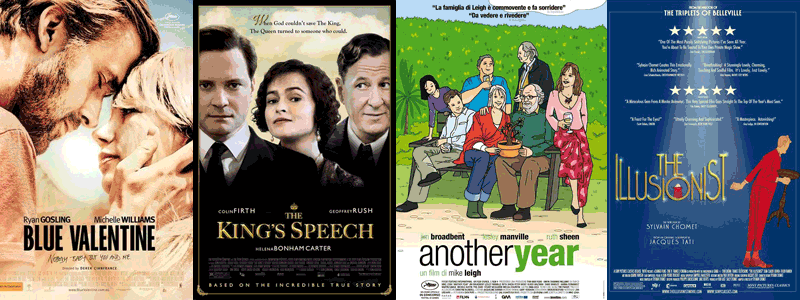| “The Help”-What can you say about a film that’s based on the modern-day book of a white woman (Kathryn Stockett) about a very touchy subject like race relations in Mississippi in 1963? Well, it’s wonderful. There are some uncomfortable scenes in this film, but the script and the theme are dynamite and virtually every performance is extraordinary. The plot centers around a group of empty-headed well-to-do white women in Jackson, Mississippi, all of whom have black women as maids who raise their children, clean their homes, and are treated almost like slaves. The leader of this unwholesome group is Hilly Holbrook (a powerful performance by Bryce Dallas Howard as an evil witch) whose primary concern in life appears to be her unhappiness with the fact that the maids share the white families’ bathrooms. But also a part of this group is Skeeter Phelan (the delightful and up-and-coming Emma Stone), a recent Ole Miss graduate who plans to be a writer and who is actually a human being. Skeeter, observing the way the maids are horribly mistreated by their employers, decides to interview them and write a book about their experiences. This is obviously a very dangerous path for Skeeter and the maids to take in Mississippi in 1963 (for those who didn’t live through this era, recall the murder of Medgar Evers which is mentioned in the film, and the murders of three civil rights workers in Philadelphia, MS, which took place the following year). But take it they do (whether likely or not, it serves the point of the film to tell the maids’ stories). And what of the maids? There is an absolutely mind-blowing performance by Viola Davis (a tremendous actress) as Abileen Clark, whose son has died at the hands of the racists, and who daily suffers the insults and indignities of raising the child of an insufferable white woman. And then there is the breakthrough performance of Octavia Spencer in the wonderful role of Minny Jackson, a maid who does the unthinkable to get revenge on her hateful ex-boss, Hilly Holbrook. But Emma Stone, Bryce Dallas Howard, Viola Davis and Octavia Spencer’s performances are not alone. Also terrific are Allison Janney as Skeeter’s mother who has done the worst thing imaginable to her maid of many years, Constantine Jefferson (Cicely Tyson) (a woman who raised Skeeter), just so she could impress a group of racist women; Sissy Spacek (one of my favorite performers) in the very humorous role of Hilly’s absent-minded but still-together mother; and last, but absolutely not least, Jessica Chastain as the bumbling, but warm-hearted and delightfully sincere Celia Foote, a role so unlike the part she played in “The Tree of Life” that it serves to demonstrate the emergence of another brilliant young actress. “The Help” is directed by Tate Taylor, someone I’d never heard of before, but who is tremendously talented and should be watched very closely in the future. My only criticism of this film is the unlikely ending but that can be excused because I can’t imagine anyone really wanting this outstanding film to end any other way. A (12/17/11) | |

















































